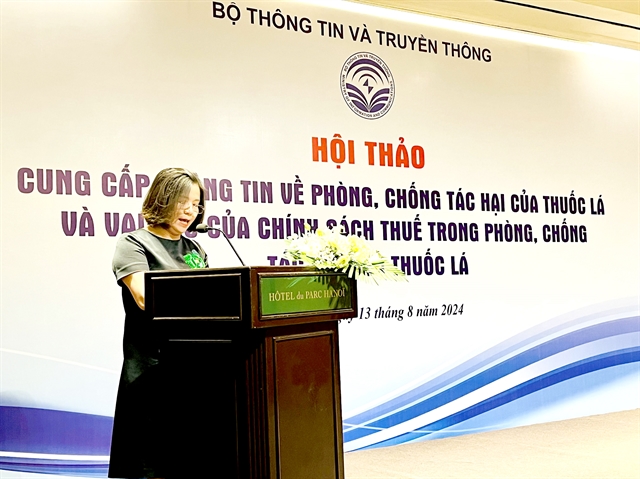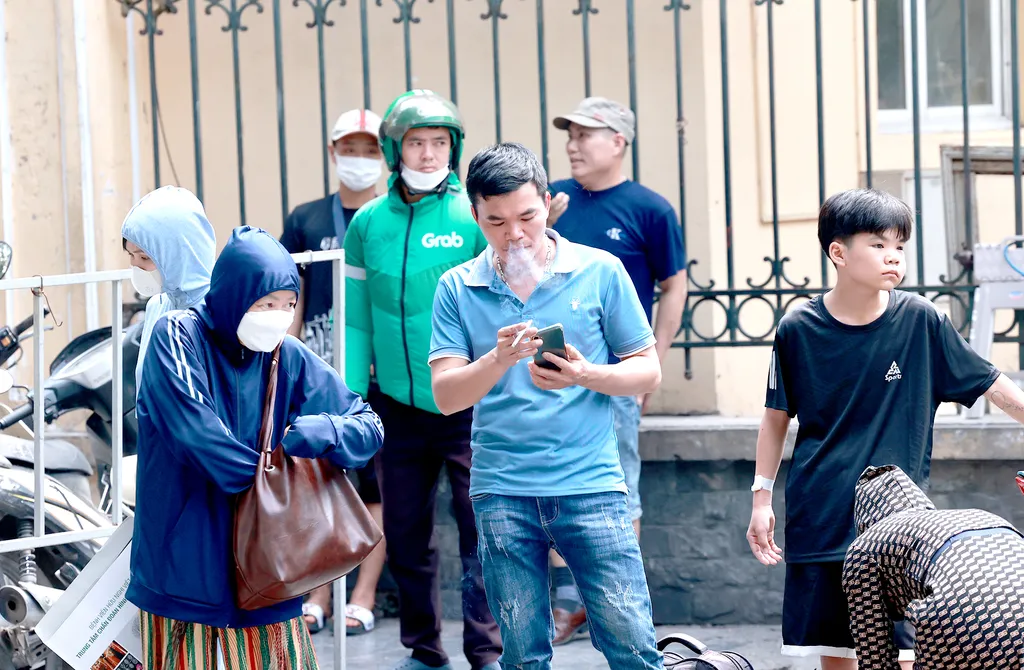 |
| Trần Thị Nhị Thủy, director of the Legal Department at the Ministry of Information and Communications delivers her speech at a seminar on Tuesday in Hà Nội.—VNS Photo Nguyễn Hằng |
HÀ NỘI — An increase in tobacco taxes will benefit both the public and the Government, providing additional revenue for the State while reducing the burden and costs associated with tobacco-related illnesses.
Nguyễn Tuấn Lâm, a representative from the World Health Organization (WHO), made this statement during a seminar titled 'Providing Information on the Harms of Tobacco and the Role of Tax Policy in Tobacco Control', organised by the Ministry of Information and Communications on Tuesday in Hà Nội.
Lâm highlighted that tobacco tax in Việt Nam currently stood at over 38 per cent, compared to 78 per cent in Thailand, 71 per cent in the Philippines, 70 per cent in Singapore and 60 per cent in Brunei.
So Việt Nam’s tobacco tax was significantly lower than the global average.
Việt Nam consumed twice as much tobacco as Thailand, yet collected only one-third of the tax revenue that Thailand did.
In 2016, Việt Nam generated approximately VNĐ17,000 billion (US$676 million) in tobacco tax revenues.
In contrast, Thailand raised its tobacco tax every 2-3 years, with revenue increasing from $500 million in 1981 to $2.2 billion in 2017. Additionally, Thailand reduced its smoking rate from 32 per cent in 1981 to 19.1 per cent in 2017, he said.
Similarly, in the Philippines, increasing tobacco taxes had led to a reduction in smoking rates and an increase in revenue.
The Philippines collected $2.2 billion in tobacco taxes in 2015 and $2.9 billion in 2022, while smoking rates dropped from 23.8 per cent in 2015 to 19.5 per cent in 2022.
The WHO recommended that excise taxes should reach VNĐ5,000 ($0.19) per pack by 2030, in addition to a product tax amounting to 75 per cent of the current ex-factory price.
This would result in a 169 per cent increase in Government revenue from tobacco taxes by 2030, an additional VNĐ29.3 trillion ($1.16 billion).
Under the Ministry of Finance’s alternative plan, the excise tax should reach VNĐ10,000 ($0.38) per pack by 2030, also with a product tax at 75 per cent of the current ex-factory price.
This would result in a 126 per cent increase in revenue by 2030, an additional VNĐ21.8 trillion ($865 million).
 |
| A man smokes cigarette while walking around in Hà Nội. VNS Photo Trương V |
According to Đinh Thị Thu Thủy, deputy director of the Legal Department at the Ministry of Health, Việt Nam remains among the top 15 countries with the highest smoking rates among adult men globally and ranks third in ASEAN. It was estimated 40,000-70,000 early deaths annually were due to tobacco use.
The direct and indirect healthcare costs related to tobacco use were VNĐ108 trillion ($428 billion), equivalent to 1.14 per cent of Việt Nam's GDP in 2022, while total tobacco tax revenue in 2022 was less than one fifth of the healthcare costs according to a 2023 study by the Health Economics Association.
Currently, tobacco taxes and prices in Việt Nam were very low, making it easy for people and children to access and purchase tobacco products.
From 2008 to 2019, Việt Nam implemented three increases in the special consumption tax on tobacco, but each increase was modest at five per cent, with lengthy intervals between hikes (from 55 per cent to 65 per cent in 2008, from 65 per cent to 70 per cent in 2016 and from 70 per cent to 75 per cent in 2019).
Despite the 75 per cent special consumption tax rate, total tax on retail prices only accounts for 38.8 per cent. Therefore, Việt Nam is among the countries with the lowest tobacco taxes and prices worldwide, below the ASEAN average.
Protecting people's health
Trần Thị Nhị Thủy, director of the Legal Department at the Ministry of Information and Communications, said that increasing taxes on tobacco products would raise retail prices, which would deter consumers from purchasing them.
"Higher prices are particularly effective in preventing youth and low-income individuals from starting or continuing to smoke," she said.
Additionally, higher prices may lead to reduced consumption among current smokers, with some possibly cutting back or quitting altogether.
Angela Pratt, WHO Representative in Việt Nam said "Today's workshop is very timely, given that Việt Nam is facing some very important decisions about how best to protect people from the dangers of tobacco use."
Tobacco is very harmful to health. It caused more than eight million deaths each year around the world and tens of thousands of preventable deaths every year here in Việt Nam.
Việt Nam made some very good progress in the fight against tobacco harms in the last decade.
"However, on current trends, we will not achieve the national tobacco control strategy target of reducing smoking rates to less than 36 per cent by 2030," she said.
Recent signs were that tobacco consumption, might in fact, be starting to increase again in Việt Nam, with the General Statistics Office reporting that total cigarette production increased by more than 10 per cent between 2022 and 2023, she said.
All of that made one thing very clear.
“We need to take stronger action to reduce tobacco use in Việt Nam to protect health and to save lives.”
WHO congratulated the Ministry of Finance and the Government for the draft revised excise tax law, which was released for public comment in June.
“The proposed law is a step in the right direction but it’s not enough. Not enough to achieve the national smoking reduction targets," she said.
WHO believes that Việt Nam has a unique opportunity right now, during the revision of the excise tax law, to aim higher and to achieve more for people’s health.
Tobacco industry claims
The WHO representative also said there was one thing that we could be absolutely sure of in the coming months and that was the tobacco industry would fight these and other efforts to reduce consumption of their products.
Firstly, the industry would argue that higher tax and therefore higher prices would result in more tobacco being smuggled into Việt Nam.
“This is not true,” she said.
All of the evidence showed that price was not a factor in smuggling.
People who smoked smuggled cigarettes were sometimes willing to pay more for particular brands than for the domestic brands.
The most important factor which affected the level of smuggling or illicit trade was enforcement capacity and efforts by the authorities.
Secondly, the tobacco industry would claim that higher taxes would mean higher unemployment.
“Again, just not true,” she added.
When the price of tobacco went up, people’s spending shifted to other products.
So, the Government would have more revenue to invest back into the economy, into areas like health and education, which unlike tobacco, would increase the country’s productivity and growth.
Ministry of Health's stance
Đinh Thị Thu Thủy, deputy director of the Legal Department at the Ministry of Health, said that the Politburo, Government, National Assembly and the health ministry were all in agreement with increasing tobacco taxes as recommended by the WHO.
The health ministry fully supported the Ministry of Finance's proposal to raise taxes on certain products, including tobacco.
The health ministry endorsed and agreed with the finance ministry's proposals in the draft Special Consumption Tax Law (amended) to institutionalise and implement resolutions from the National Assembly, Government and the Politburo as outlined in the draft presentation.
That included Resolution No. 20-NQ/TW of the Party Central Committee on continuing to protect, care for and improve public health in the new situation.
However, to better align with the guiding principles and directives of the Party and State, the health ministry requests that the ministry of finance consider increasing tobacco taxes to reach 75 per cent by 2030 as recommended by the WHO and stipulated in the Strategy accompanying Decision No. 568/QĐ-TTg by the Prime Minister.
The health ministry proposed that the ministry of finance raise tobacco taxes significantly and implement a phased increase to minimise the rate of tobacco use among the population.
"All of the health ministry's proposals are aimed at safeguarding public health and achieving the goal of improving healthcare for the population," she said.
The health ministry's position on this issue was very clear. The ministry would not engage with tobacco companies during the policy development process concerning increased tobacco taxes.— VNS


